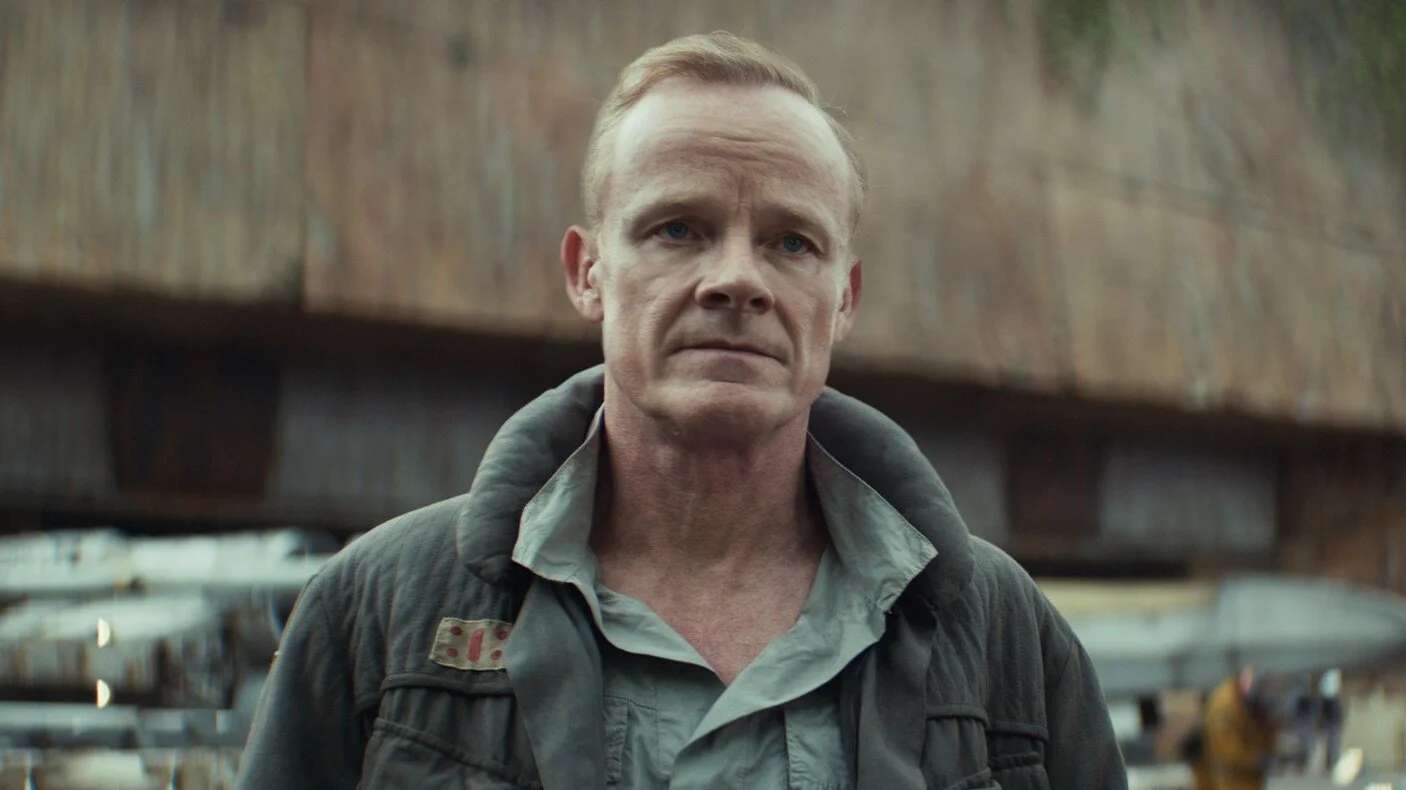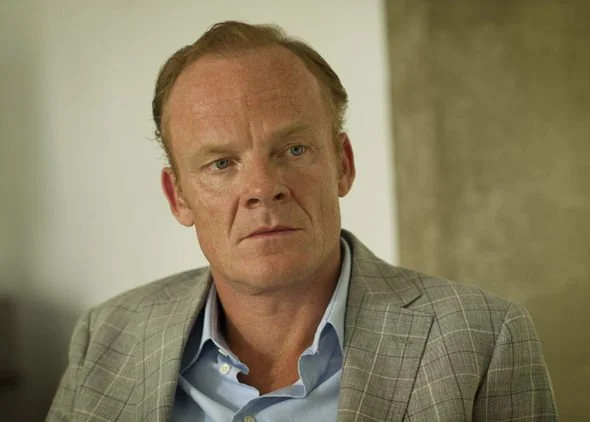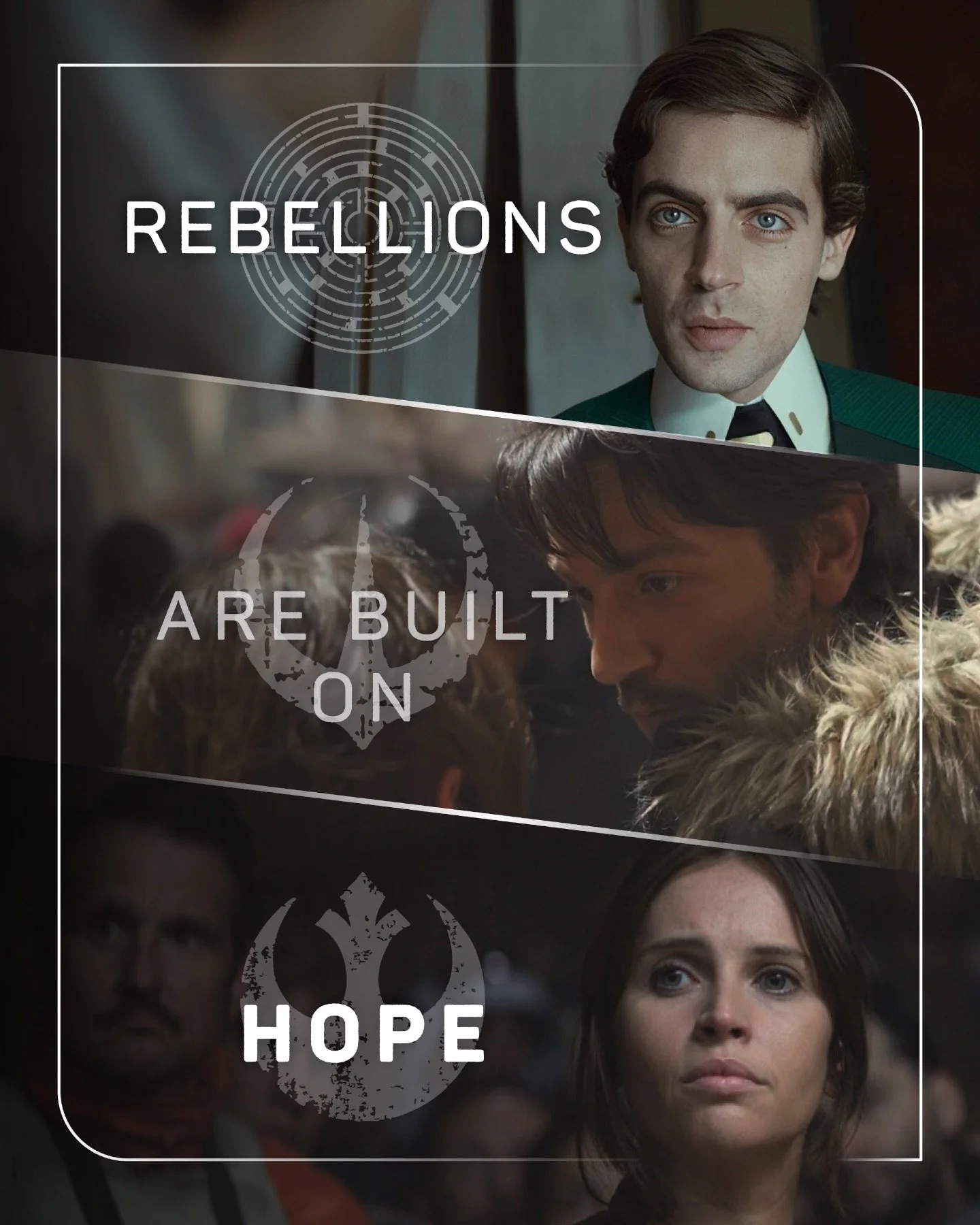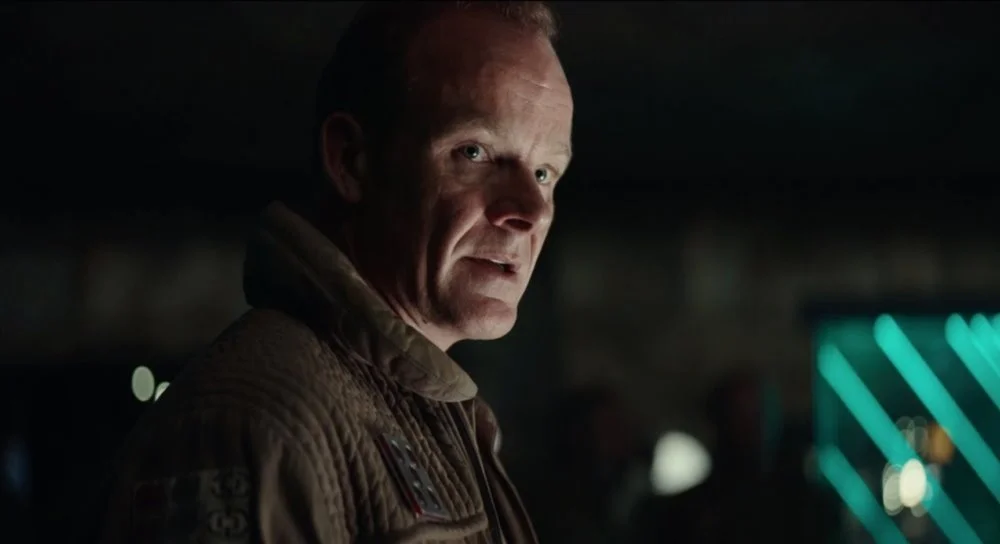Built on Hope: Alistair Petrie in Conversation
Star Wars fans have had it good lately. Bringing Cassian’s story to a close, Andor season 2 is, by all accounts, some of the best Star Wars storytelling — and showrunning — to date.
It was my pleasure to speak in June with Alistair Petrie, who portrays Andor’s rebel superior General Draven in Rogue One and Andor S2. We talk about Alistair’s incredible acting career, his experiences becoming part of the Star Wars megalith, times on set, and much more. Spoilers for Draven’s fate in the graphic novels!
The following conversation has been edited for length and clarity.
Alistair Petrie as Davits Draven in Andor Season 2e10 (2025). dir. Alonso Ruizpalacios. Disney+.
Tom: How are you doing? What's life been like for the past few months?
Alistair: Very good! I'm going back to the stage for the first time in 10 years, for Hamlet at the National Theatre, so I'm getting on top of that. I'm playing Claudius, and there's a lot to sort of consume and get your head around. I’m doing a lot of preparation work, so that when I start rehearsals I’ll have some confidence, and a modicum of early choices! I tend to take myself off somewhere to concentrate. At the moment I'm in Cornwall, so I’m balancing working on Hamlet and enjoying the sunshine.
Tom: Ten years is a good chunk! What’s kept you away from theatre?
Alistair: Two reasons really. The last time I did a play, all my kids were at school. I've always been very conscious of being an active parent rather than just being constantly away. It was difficult to balance work and life, which is the ultimate goal of course.
After an eight-month run, I sort of made a subconscious pact with myself that to go back to the stage, it would have to be the right play, the right director, the right part, the right venue. And so I've passed on a fair few roles over the years. And this Hamlet run arrived and ticked all those proverbial boxes. It’s about a nine week run, from autumn to early winter — West End runs would be at least six months. A lot of actors say you sort of don't prove your mettle until you're on stage. But I think true acting can exist in all sorts of mediums.
Ten years back would have been The Night Manager and Rogue One. Was it also that those two massive projects took over as another factor?
Alistair: Yeah, I was asked to do The Night Manager just before we finished the run of the play, and that segued into more TV. Rogue One sort of wedged in the middle. When I was asked to do it by Gareth Evans, and Jina Jay (the casting director), it was just to pop up in a Star Wars film. I've quoted this a few times, but because of my sons, and because Star Wars was the first film I saw in the cinema in 1978, it was completely magical — so I just said, yeah, great. I was up for it whatever; my only two criteria were having a line and a name! It was like wanting to pop up in a Bond film — “just put me behind a desk, give me a line, great!” I was on holiday at the time, and told my family it was just one scene, it'll take half a day to shoot and then, you know, I'll be on my way. I thought they’d just nominate a day to shoot, and I’d just whip up to Pinewood and get it done. And gloriously it turned into something much more than that.
Alistair Petrie as Lord Alexander "Sandy" Langbourne in The Night Manager, season 1 (2016). Dir. Susanne Bier.
It feels quite emblematic of the industry and being an actor really. Every time you think you've understood it and pinned it down, it throws you wildly off in different directions. It's a thing I absolutely love about it.
Tom: As William Goldman says, nobody knows anything!
Alistair: Oh absolutely — I love his book as well.
Tom: So playing General Draven popped up as a fun opportunity, but little more than that. After your role got bigger, how did you start conceive of the character? How do you see him coming into the bigger Rebellion picture?
Alistair: I remember when someone first sent me a link to the gloriously named Wookieepedia — it’s got a literal biography of where he was born and everything. I just thought it was amazing that these people invest so much time and effort and storytelling brilliance into building out these characters that means so much to so many people.
And then it becomes fact, it's like this brilliant roadmap. Because you take it as read, you don't disagree with any of it; someone somewhere has come up with this extraordinary thing that embeds so much of the storytelling into solid rock foundations. And my job as an actor is to give life to those foundations I suppose. Seeing your own face drawn for the graphic novels is something else, too. If you play Hamlet, a dozen other people can play Hamlet. A television show can get a reboot. Even this stuff could be rebooted, but to some extent there's a lot of me attached to him, which I find an enormous kind of privilege. I really do.
What I love is the idea that these stories belong to everybody, that so many different actors have invested themselves in the telling of this story. And I'm just one of those people. But there's so many different angles that compile to make this extraordinary. I hate to use the word “franchise” because it’s a glib industry term. I really think the journey of Star Wars from its first incarnation to what is now speaks so much to who we are as a species. There's something deeply magical about it. It's the ultimate in storytelling in many ways. And given where we are in the world now, Andor especially reflects so much back at us, it's so terrifyingly prescient.
It still means an awful lot to me. It was never, ever just a job. I remember the first day we stepped on on the set up at Cardington to do a couple of days of rehearsal with Gareth Edwards before they'd even shot a frame. We stood on this vast set of Yavin 4 — it was the biggest any of us had ever been on. And Gareth gathered us all together. I mean, Jimmy Smits was there. Genevieve O’Reilly, Diego [Luna], obviously, Felicity [Jones], we were all there just taking it all in. Gareth’s such a low-key director with an independent mindset — he’s very much grab-camera-shoot. And he sort of looked at us with our mouths open. And he said, “I know how you feel. Last week I was recording in New York, sitting in a studio, listening to James Earl Jones record Vader!” We all had to park that and get on with telling the story. We were all very childlike at first. And now, I think of the last 10 years sporadically, you know, it’s part of my life forever. It’s enormously gratifying.
Tom: It’s funny you mention Wookieepedia. I watched a great video lately critiquing how Fandom works (the umbrella site that owns fan wikis).
But like you said, the level of commitment to databasing is quite extraordinary. There are some very hardcore Star Wars fans out there.
Alistair: Yes, I find it interesting to ask who takes ownership over what, and I guess there's probably endless arguments about so many details. I don’t know who I would go to for the definitive answer about X relationship, or what this person had for breakfast on Pendar III and so on.
It reminds me a bit of working with John Schwartz on Rogue One. He was one of the executive producers. They’re very frugal with handing out scripts. Felicity had to fight really hard to get one -- and she’s the lead in the film! But John knew everything. If you had a question, he could tie in everything and give you a roadmap. The first time we shot the scene where I say, “We have no hope”, John took me to one side and said, “we're going to need you to say that line outwards to everybody. So everybody in the hangar can hear it. It's a big button line.” Because then Felicity chimes in with “Rebellions are built on hope”. Hope is the thing. And then he told me something no one else in the room knew at the time — at the end of the film, Princess Leia appears. And it was a bizarre and wonderful moment, being given this goldmine, a little sealed box of knowledge. In a sense John was the font of all knowledge about Star Wars. He's doing other things these days. But yeah, who takes ownership of the definitive version of it?
You make one story slip and people come down on you like a ton of bricks. And I don't think they did for Rogue One or Andor, in terms of any of the links with the lore and the canon and the timing and where it slots in. I can't say enough good things about Tony Gilroy.
The legacy of Jyn Erso’s line…
Tom: Yeah, I think that’s not always the case… There is a certain contingent of online Star Wars fans that are, well, not worth interacting with. There are people who will take their investment in the canon to the point of being extremely punitive of creatives, and that came out in a very ugly way with the sequel trilogy.
Alistair: Beautifully put!
Tom: It was a deeply unfortunate crossroads between what people saw as bumbling, executive-level distanced attempts to please everyone — which often fail — with a rising trend in female protagonists and more characters of colour. As a reviewer, it’s irritating to see lazy criticism online dealing with easy targets. But that's not the case with Rogue One. You can see Gareth Edwards’ fingerprints all over it. The Jedha and Eadu sequences are beautiful.
Alistair: Completely. We had this lovely moment between setups when I just felt like a kid that stood up out of his seat and walked down the gangway and walked into the screen.
And Gareth said he felt exactly the same way. It's not easy to referee something of that scale. Obviously he'd done Godzilla before that. It's such a beast of a machine that you're working with. And the expectations are huge. Like I said, he has this wonderful independent filmmaker’s mindset, within a vast studio system.
Tom: Did you end up talking much with Tony Gilroy during Rogue One shoots?
Alistair: Very much so. One thing to mention is, all big budget films will always do reshoots. I think a lot of people think something’s wrong as soon as you hear reshoots or pickups. But it always happens. It's like finishing a house, you know, there's still going to be six months of snagging! We did around five or six weeks of reshoots, which really isn't very long for that scale of production. I remember the first day we got back in. I was sitting in a dressing room at Pinewood at 7:30 morning. And Tony walked in with his breakfast, and he plonked himself down and introduced himself and said, right, this is what we're going to do. He was like this brilliant New York whirlwind. He was very quick to explain he wasn’t coming at this as a fan, that Gareth was tied up with visual effects, and we needed to punch up a couple of things with a new pass on the script.
Everyone was totally happy to come back to film more and to hang out. There was a great sense of camaraderie. Diego and I had this joke that it wasn't called Rogue One: a Star Wars Story, it was called Rogue One Scene 16. Scene 16 is where Jyn also gets brought in, and we're sitting around there and we're grilling her. I don’t even know how many times we shot that.
Everyone was highly invested in what Tony was trying to do. And it was also very elegantly done — Tony got a co-writing credit at the end of it. A bigger ego would have demanded much more in many ways, but he didn't. And I'm sure he was well compensated. Normally these things are so brilliantly structured, as you know, but this was very ad hoc. You’d be getting your makeup off and someone would poke their head round the door and say, "Are you around on Tuesday?"
One day, someone came in with with an Imperial costume and put it against my back while I was putting my socks on. And I thought, Oh, this is some weird story beat I didn't know about. And no one really described what was going on. The next day I found out why — they wanted a reshoot for the scene when Galen Erso dies in the rain, with a new shot on Felicity because they'd tweaked the scene. Obviously it's a highly charged emotional scene, but Mads [Mikkelsen] wasn’t around, and apparently Felicity asked me if I’d be happy getting “Mads-ed up”!
I think a lot of actors would turn around say no to that, but in the context of those reshoots we were such a happy ensemble that I immediately said, yeah, of course I'll be there for Felicity. So they literally put me into makeup and they Madsed me up. And because I was clean shaven for Draven, they gave me full stubble and a wig to suit Mads’ hair. I think my proudest pub quiz moment is that it’s actually my left hand, not Mads’, when it’s supposed to be his hand that goes up and cups Felicity's face.
It’s one of my fondest memories of the shoot, it just sums up the “Sure, let’s do it” attitude that we all had for that movie, it's amazing.
Tom: I deeply envy getting “Madsed up”! That's going to be a bucket list item now…
Alistair: There’s a hell of a photograph of me looking like Mads. He’s a legend. I know that Andy Serkis has, but if you had to name another actor who’s played two parts in a Star Wars story, then I guess I'm on the list!
Tom: I'm sure there’s a list on Wookieepedia as well…
Like you say, things happen in big productions and you have to pull together in ways that are never going to be recognised. I remember when Rogue One was releasing, and Gareth Edwards had to deny all these claims that he was getting in favour of Gilroy. But of course, it worked out, and Tony ended up doing much more extensive work on Andor. When was the first time that you heard about the show?
Alistair: Back in 2017 or 2018, I was called to have lunch with Stephen Schiff, who was the original showrunner on Andor. John Schwartz was execing it at that point. And they told me the plan of a sort of a six-season Andor show, and they wanted to sound me out about it. Of course I was very keen, and was grateful they’d talked to me. And then as these things can happen, it just went quiet. About a year later, I sent an email to John Schwartz, and then found out he wasn’t actually with Lucasfilm anymore. And they sort of left it at that. Stuff collapses all the time — my happy interpretation was that the way it was building up was not where they wanted to take the story. Originally, Tony Gilroy had emailed Kathleen Kennedy a little after Rogue One when streaming was still early doors. He wasn’t pitching for the job but told her how he’d do it. And later he jumped back on board when she approached him again. Tony called me and let me know that with the new timeline I’d come in for season two — was I up for it? Fuck yes!
A couple of years ago he came back to me again. It’s all been brewing for a while. Tony must have reattached to the project in spring 2018.
Tom: Just like how good rebellions ferment over time… It's crazy to think of the first incarnation of Andor as six seasons. With how it turned out, we wish!
Alistair: It's funny, isn't it? For Diego, it would have been 10 years for a show of that scale. Diego’s inevitably been heavily involved. It’s already been five years of his life. And you're not gonna be doing much else. I did a film once that Alan Rickman directed. And Harry Potter had just finished. I remember asking Alan why it took him so long to do his second film. He just went, “Harry Potter”. There's no way he could prep, shoot, edit, and promote a film at the same time.
So it's a big thing to take on if you are number one on the call sheet and exec producing, as Diego was. I think it’s perfect as it is — since the show leads right into Rogue One, we cannot continue with this story. It's done, the story's told. And there's something glorious in that. No bean counter can turn around and plan another season. I think Gilroy is done, too.
Alistair Petrie as Davits Draven in Rogue One (2015) dir. Gareth Edwards. Lucasfilm Ltd.
Tom: What was it like coming back to Draven after a few years? He’s younger in Andor S2 than in Rogue One — but only very slightly. So what thoughts did you have in terms of bringing new elements to the character?
Alistair: It’s a good question. It sounds trivial really, but I'd forgotten what it felt like to put the costume on. It's a strange feeling when you do.
It’s the literal stepping-into-shoes thing. Costume is a sort of strange skin you put on, and that’s fairly surface level, but it's also about connecting to consistent writing. I've worked on stuff for a returning series where you don't recognize the voice in the writing, and you challenge that. It’s an old cliché, an actor going “But my character would never say that!” So much character work is about who you're playing opposite — like when I see Diego for the first time, I have to place myself in the timeline very carefully. Prequels are always quite strange. Yu have to remind yourself, what do I know? What do I not know? Like seeing a K2 enforcer unit for the first time — you have to think, fucking hell, what's that doing here? And equally — what do I have to forget? Scripts will tell you everything you need to know, in theory. And if the script is good, and well written, it will give you so much that you need. But equally putting on the costume, you walk different — with Draven, for example, the shoulders go back, and I stand a little taller.
Tom: Plus the setting of Yavin 4 must help to get back in the mindset.
Alistair: Although the set was built in a different place, it was still at the same scale and size, so when I walked on set I could say I know where I am — and Draven’s status makes him carry himself in a different way. I suppose it’s about taking charge — not in an arrogant way, but just to say to yourself you have every right to be here. The job’s to perform, but there’s leadership in there too.
Tom: It’s an important impulse. Even as a supporting artist — work I’ve done for around six years — it's very easy to have a sense that you’re not important. But the moment you relinquish responsibility on set, you enjoy it less, and everyone can tell. Even in the situations where you yourself do not have much of a say, there's a great importance to how you carry yourself.
Alistair: Absolutely — we have to make sure that we have agency in whatever it was we're doing. It's a life lesson I've always tried to instil in my sons, which is, you know, whatever you do in life, do it to the best of your ability, because a), you'll enjoy it more, and b), you know, from that opportunity will come.
Actors have done it all. If you have to wait tables or do whatever to pay the rent, do it to the best of your ability. It's fairly straightforward, but still a good life lesson.
Tom: Moving from life to death… I had a friend who told me about Draven’s demise in the comics. I'm aware that that you get the great privilege of being killed by Vader himself. How do you feel about the end of your character?
Alistair: Someone sent it to me. I'd never come across it when the issue came out. Of course, I ended up buying umpteen copies to have. It’s surreal to see your own face kind of drawn or painted like that. It made me think two things — one, like I was saying earlier, it feels like there’s so much of me attached to the character. And two, his death is his redemption in many ways. Leia wants to confront Vader, but Draven goes instead. I love his last line. It all turned me into a slightly giddy teenager all over again. So yeah, I love the fact that now I know how he dies in a moment of extreme glory with quite a cool sign off line.
Over the years I've been shot in the face, all sort of things. But number one will always be being death gripped by Vader..!
Many thanks to Alistair for his time. Stay tuned for the second part of this conversation, coming soon!
The Night Manager season 2 is in post-production.
Tickets for RSC’s Hamlet (25 Sept - 22 Nov) are available here.
Rogue One, and all episodes of Andor Season 2, are available now on Disney+.



